Ciao carissimi
lettori,
Oggi ritorno con
un’altra recensione letterario. Come vi ho abituato ormai, anche il questo caso
si tratta di un libro di uno scrittore che ha vinto il Premio Nobel per la
letteratura. In questo caso l’autore è Mo Yan, pseudonimo per Guan Moye, famoso
scrittore e saggista cinese che nel 2005 vinse il Premio Nobel per la letteratura.
Mo Yan è uno dei più rilevanti scrittori cinesi e attraverso la sua opera
impregnata di poesia, sentimenti basilari e violenza, fa scoprire ai suoi
lettori l’anima senza tempo della grande civiltà cinese.
Prima di
recensire questo libro, è importante che io faccia alcune precisazioni in modo
da poter capire fin in fondo, o almeno cercare di capire questo romanzo carico
di connotazioni politiche senza saltare subito a delle conclusioni affrettate
come lo hanno fatto anche alcuni personaggi molto famosi e fra questi persino
una delle mie scrittrici preferite, Herta Muller, che aveva chiesto alla
commissione letteraria per il Nobel di ritirare questo premio a Mo Yan. Mo Yan
è nato durante un regime comunista, durante un’epoca di grande povertà e grandi
sacrifici per ripristinare l’economia di un paese stremato dalle invasioni
giapponesi, è cresciuto e ha vissuto tutta la sua vita da giovane durante l’era
della politica di contenimento delle nascite e perciò ha un figlio unico.
Nonostante la sua personale situazione, il suo romanzo Le Rane, che voglio
recensire oggi, esplora da ogni angolo, i tormenti che questa politica abbia
creato al suo popolo. Il romanzo Le Rane, fu scritto dopo che lui vinse in
Nobel e nonostante questo, il Corriere della Sera scrisse: “Mai Nobel è stato
più meritato di questo”. Rivelo già il fatto che concordo pienamente con quanto
affermato dal famoso giornale italiano. Questo romanzo riporta alla luce il
forte contrasto che ha governato la società cinese durante la politica di
contenimento delle nascite, un contrasto che è sfociato in un vero conflitto
sanguinoso e che ha reclamato tante vite. Vi consiglio di non cominciare la
lettura di questo romanzo cercando di capire chi ha ragione e chi ha torto
perché ne resterete delusi, lo scrittore stesso non ha scelto da quale parte
stare, quindi è frustrante voler simpatizzare con chi cerca di applicare le
regole dello stato per salvaguardare il futuro del paese per poi rimanere
delusi vedendo i metodi scelti per applicare la legge, oppure simpatizzare con
coloro che fanno tutto il possibile per avere più bambini, mettendo a rischio
le vite di tutti coloro che ne stanno intorno senza considerare minimamente
quello che potrebbe succedere in futuro persino ai loro stessi bambini.
Il romanzo Le
Rane è scritto in prima persona ed ha un aspetto epistolare dove i capitoli
rappresentano le lettere che Wan Zu, drammaturgo conosciuto con il nome d’arte
Girino, scrive al signor Yoshihito Sugitani, grande uomo di lettere e famoso
scrittore. L’azione di questo romanzo si svolge nella provincia di Gaomi, dove
lo scrittore stesso è nato e racconta la storia di Wan Zu e di sua famiglia
concentrandosi soprattutto su Wan Xin, la zia di Girino e le sue avventure
durante l’epoca del controllo delle nascite. Wan Zin è la zia materna di Wan
Zu, da bambina fu tenuta in ostaggio dai giapponesi per far pressione sul padre
e dopo la liberazione studiò medicina e diventò ostetrica. Nelle prime pagine
assistiamo alla sua lotta contro una società retrograda, che si rifiuta di far
partorire le donne in cliniche con personale medico adeguatamente preparato e
affida ancora questo intervento particolarmente sensibile alle mammane, una
specie di sciamane, anziane del popolo che si avvalgono di superstizioni, canti
e riti loschi. Inizialmente si confronta con la reticenza della gente ma poi il
successo ottenuto, il calo della mortalità fra neonati e puerpere la alzano a
livelli di legenda. Per diversi anni lei diventa infatti la preferita di ogni
donna incinta, colei che è levatrice per antonomasia. Successivamente la Cina
viene scossa dalla cosiddetta Rivoluzione Culturale e dopo essere diventati il
paese più numeroso del mondo, il partito comunista si vede costretto a mettere
in atto una politica di controllo delle nascite per preservare le risorse e
garantire un futuro ai suoi cittadini. Inizialmente si parte da un invito
volontario ad usare metodi di contracettivi messi a disposizione gratuitamente
dallo stato, poi si passa alla sterilizzazione maschile volontaria di coloro che
hanno già avuto bambini e all’inserimento della spirale alle donne che avevano
già avuto un bambino. Purtroppo in un popolo dove il terreno era stato diviso e
assegnato ai suoi abitanti, le persone che non si vedevano mancare il cibo in
quel momento, non volevano limitarsi di procreare perché avevano già
dimenticato le penurie e la minaccia di quello che poteva capitare a questi
figli negli anni avvenire, non era imminente e sembrava che non li riguardasse.
In questa situazione le donne si rivolgono a individui loschi che rimuovono
illegalmente i dispositivi intrauterini e assistiamo ad un aumento di nascite
non dichiarate o illegali. In questa situazione Wan Zin, devota al partito e
alla sua causa, diventa da levatrice, la più agguerrita combattente contro le
gravidanze illegali. Per seguire questo scopo non guarda in faccia nessuno e
non considera nemmeno lo stato avanzato di una gravidanza, obbligando in tanti
casi le madri ad abortire in un momento in cui un bambino nato prematuro
avrebbe benissimo potuto vivere. Il concetto che alimentava gli animi, sia di
un lato che da l’altro era che una volta nato, un bambino diventava un essere
umano e la società doveva garantirli dei diritti quindi lo scopo degli addetti
al controllo delle nascite era di sopprimere le gravidanze prima che il bambino
fosse partorito mentre quello delle madri era di partorire a tutti i costi il
bambino prima che le istituzioni le rintracciassero. Da entrambe le parti,
gente viene ferita, gente muore e gente finisce in prigione in una situazione
rocambolesca, quasi delirante che per certi versi sembra quasi incredibile. La
situazione sembra calmarsi quando al posto delle misure aggressive vengono
introdotte le multe perché in quel caso la gente si rende conto delle perdite e
delle limitazioni. Anche in questo caso ci sono coloro che data la situazione
economica personale si permettono di pagare le multe e quindi procreare a
volontà oppure pagare altri perché infrangessero le regole per loro.
Dove stanno le
rane in tutta questa storia, vi chiederete voi? Beh, leggendo questo romanzo ho
scoperto che in cinese la parola rana e la parola bambino si pronunciano quasi
allo stesso modo con un suono molto simile al pianto di un bambino e al
gracidio delle rane (wa). Dopo il suo ritiro in pensione, Wan Zin si ritrova
perduta in una palude infestata da rane e il contatto freddo con quelle
creature cosi come il suono del loro richiamo le fanno ricordare tutti i
bambini non nati che aveva dovuto sopprimere.
Essenzialmente il
romanzo Le Rane svela e analizza tutti i suoi colori e tutte le varie
ramificazioni dell'egoismo umano, un egoismo che cerca di prevalere, che cerca
di giustificarsi e persino di riscattarsi quando diventa troppo pesante e
troppo opprimente.
Le Rane è un
romanzo molto interessante nonostante la tematica sconvolgente ed è anche
facile da leggere nonostante conti quasi 400 pagine perché viene scritto in
modo fluido, con un linguaggio scorrevole e compressibile. Inoltre contiene
diversi spunti di riflessione e considerazioni filosofiche sulla vita, la
condizione umana, lo scopo della vita, la condizione della donna in una
società, e sul modo in cui percepiamo e consideriamo il bene e il male. Mi è
piaciuto molto questo libro perché mi ha fatto scoprire un nuovo universo, mi
ha fatto guardare ed esplorare una realtà che per certi versi conoscevo già, da
un punto vista completamente diverso e completamente nuovo per me. Per questo
motivo sono convinta che chiunque leggesse questo libro lasciando da parte preconcetti,
paure e luoghi comuni, non potrà non apprezzarlo e non considerarlo una vera
opera d’arte. Confesso anche di aver apprezzato molto la letteratura di Mo Yan,
anzi ho aggiunto diversi altri suoi romanzi nella lista di future letture e lo
consiglio vivamente a chiunque volesse aprire la sua mente ed esplorare nuovi
orizzonti.


ENGLISH
Hello dear
readers,
Today I return with another literary review. As I have
become accustomed you to by now, this is also a book by a writer who won the
Nobel Prize for literature. In this case, the author is Mo Yan, pseudonym for
Guan Moye, a famous Chinese writer and essayist who in 2005 won the Nobel Prize
for literature. Mo Yan is one of the most relevant Chinese writers and through
his work impregnated with poetry, basic feelings and violence, he makes his
readers discover the timeless soul of the great Chinese civilization.
Before reviewing this book, it is important that I make some
clarifications so that I can fully understand, or at least try to understand
this novel full of political connotations without immediately jumping to hasty
conclusions as some very famous people have previously done, among them, even
one of my favorite writers, Herta Muller, who had asked the literary commission
for the Nobel Prize to recede this prize from Mo Yan. Mo Yan was born during a
communist regime, during an era of great poverty and great sacrifices to
restore the economy of a country exhausted by Japanese invasions, he grew up
and lived his entire life as a young man during the era of the politics of
containment of births and therefore has an only child. Despite his personal
situation, his novel “Frog”, which I want to review today, explores from every
angle, the agony that this politics has created for his people. The novel Frog,
was written after he won the Nobel and despite this, Corriere della Sera (Italian
newspaper) wrote: "Never Nobel was more deserved than this". I
already reveal the fact that I fully agree with what the famous Italian
newspaper said. This novel brings to light the grave contrast that ruled
Chinese society during the birth of the containment policy, a conflict that
resulted in a veritable bloody collision that claimed many lives. I advise you
not to start reading this novel trying to understand who is right and who is
wrong because you will be disappointed, the writer himself has not chosen which
side to be on, so it is frustrating to want to sympathize with those who try to
apply the rules of the state, to safeguard the future of the country and then
be disappointed by seeing the methods chosen to apply the law, or to sympathize
with those who do everything possible to have more children, putting the lives
of all those around them at risk without considering not even what could happen
to their own children in the future.
The novel Frog is written in the first person and has an
epistolary aspect where the chapters represent the letters that Wan Zu,
playwright known with the stage name Girino, writes to Mr. Yoshihito Sugitani,
a great man of letters and famous writer. The action of this novel takes place
in the province of Gaomi, where the writer himself was born and tells the story
of Wan Zu and his family focusing mainly on Wan Xin, Girino's aunt and her
adventures during the era of birth control. Wan Zin is Wan Zu's maternal aunt,
as a child she was held hostage by the Japanese to put pressure on her father
and after her release, she studied medicine and became a midwife. In the first
pages we see her fight against a retrograde society, which refuses to allow
women to give birth in clinics with adequately trained medical staff and still
entrusts this particularly sensitive intervention to the mammans, a kind of
shaman, elderly women from the peasantry who make use of superstitions, songs
and shady rites. Initially she is confronted with people's reticence but then
the success obtained, the drop in mortality among newborns and mothers, raise her
to legendary levels. In fact, for several years she became the favorite of
every pregnant woman, the quintessential midwife. Subsequently, China is shaken
by the so-called Cultural Revolution and after becoming the largest country in
the world, the Communist Party is forced to implement a birth control policy to
preserve resources and guarantee a future for its citizens. Initially, we start
with a voluntary invitation to use contraceptive methods made available free of
charge by the state, then we move on to the voluntary male sterilization of
those who have already had children and the insertion of the IUD for women who
had already had a child. Unfortunately, in a nation where the land had been
divided and assigned to its inhabitants, the people who did not face a shortage
of food at that moment, did not want to limit procreation because they had
already forgotten the shortcomings and the threat of what could happen to their
own children in later years, wasn't forthcoming and didn't seem to concern them.
In this situation, women are turning to shady individuals who illegally remove
intrauterine devices and there is an increase of unreported or illegal births. In
this situation, Wan Zin, devoted to the party and its cause, becomes from
midwife, the fiercest fighter against illegal pregnancies. To pursue this goal,
she does not look at anyone and she does not even consider the advanced state
of a pregnancy, forcing mothers in many cases to have an abortion at a time
when a premature baby could very well have lived. The concept that fed the persons,
on both sides, was that once a child was born, he became a human being and
society had to guarantee him rights so the purpose of birth control officers
was to suppress pregnancies before the child was delivered while that of the
mothers was to deliver the child at all costs before the institutions tracked
them down. On both sides, people are hurt, people die and people end up in jail
in a daring, almost delusional situation that in some ways seems almost
unbelievable. The situation seems to calm down when fines are introduced
instead of aggressive measures because in that case people realize the losses
and limitations. But, even in this case there are those who, given their
personal economic situation, allow themselves to pay the fines and therefore
procreate at will or pay others to break the rules for them.
Where are the frogs in this whole story, you may ask? Well,
reading this novel I discovered that in Chinese the word frog and the word baby
are pronounced almost the same with a sound very similar to the cry of a baby
and the croaking of frogs (wa). After retirement, Wan Zin finds herself lost in
a swamp infested with frogs and the cold contact with those creatures as well
as the sound of their call, remind her of all the unborn children she had had
to kill.
Essentially the novel The
Frogs reveals and analyzes all its colors and all the various ramifications of
human selfishness, a selfishness that tries to prevail, that tries to justify
itself and even redeem itself when it becomes too heavy and too oppressive.
The novel The Frogs reveals and analyzes all its
colors and all the various ramifications of human selfishness, a selfishness
that tries to prevail, that tries to justify itself and even redeem itself when
it becomes too heavy and too oppressive.
Frog is a very interesting novel despite the shocking theme
and it is also easy to read despite having almost 400 pages because it is
written in a fluid way, with a fluent and compressible language. It also
contains various food for thought and philosophical considerations on life, the
human condition, the purpose of life, the condition of women in a society, and
how we perceive and consider good and evil. I really liked this book because it
made me discover a new universe, it made me look and explore a reality that in
some ways I already knew, from a completely different point of view and
completely new to me. For this reason, I am convinced that anyone who reads
this book, leaving aside preconceptions, fears and clichés, cannot fail to
appreciate it and consider it a true work of art. I also confess that I enjoyed
Mo Yan's literature very much, I have indeed added several his other novels to
the list of future readings and I highly recommend it to anyone who would like
to open their mind and explore new horizons.
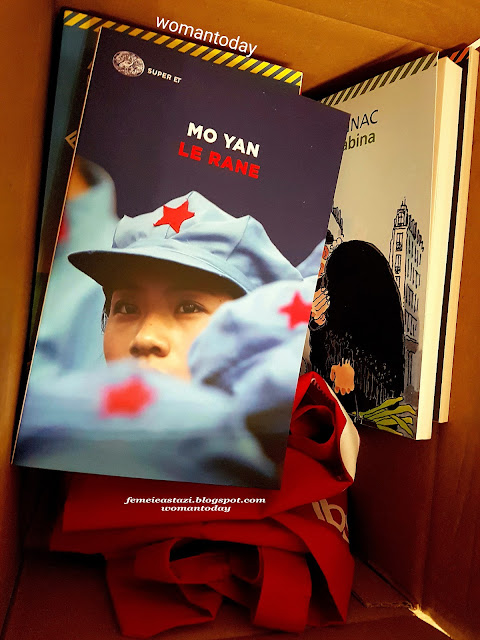

IT: Letto e recensito il romanzo LE RANE di MO YAN - ISBN 978-88-06-21996-3, Einaudi, Super ET, traduzione in italiano di Patrizia Liberati, 2014
ENG: Read and reviewed the novel LE RANE by MO YAN - ISBN 978-88-06-21996-3, Einaudi, Super ET, translation by Patrizia Liberati, 20141
Disclaimer e premesse / Disclaimer and premises
IT: Questo post non ha scopi commerciali e non incoraggia vendite, denominazioni, immagini ed eventuali link presenti sono solo a scopo informativo. Le immagini ritraggono un prodotto acquistato regolarmente che ho valutato in quanto consumatore. Questo post è di mia completa creazione per quanto riguarda contenuti, foto e idee espresse. Prima di usare qualsiasi parte di questo post siete pregati di contattarmi e nel caso vi abbia ispirato per altre creazioni, vi chiedo cortesemente di menzionare la fonte.
ENG: This post has no commercial purposes and does not encourage sales, names, pictures and eventual links are present only for an informative purpose. The images depict a regularly purchased product that I have evaluated as a consumer.This post is of my entire creation as for contents, photos and expressed ideas. Before using any part of it, you need to contact me and in case it inspired you for other creations, I gently ask you to mention the source.
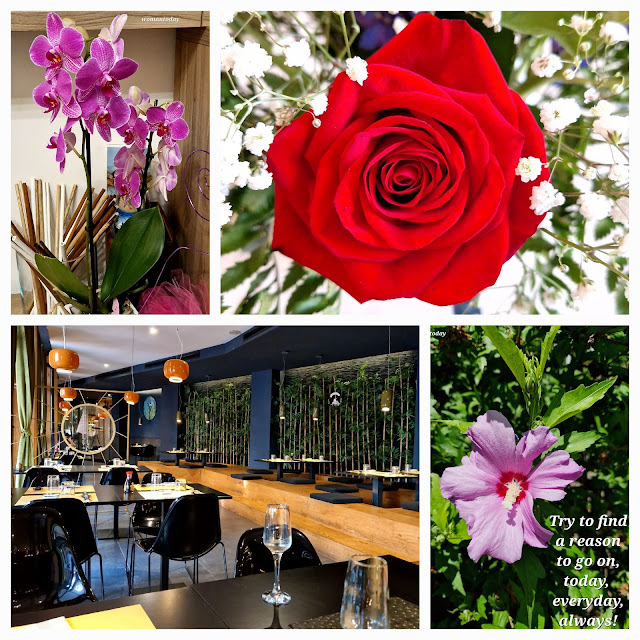


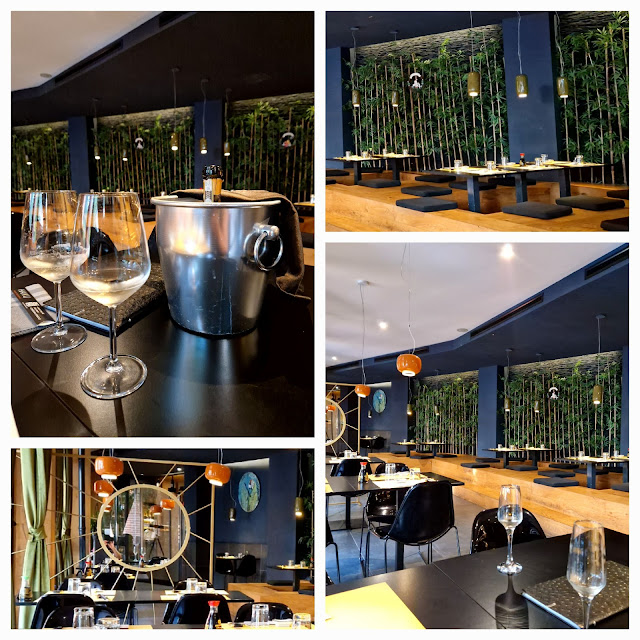

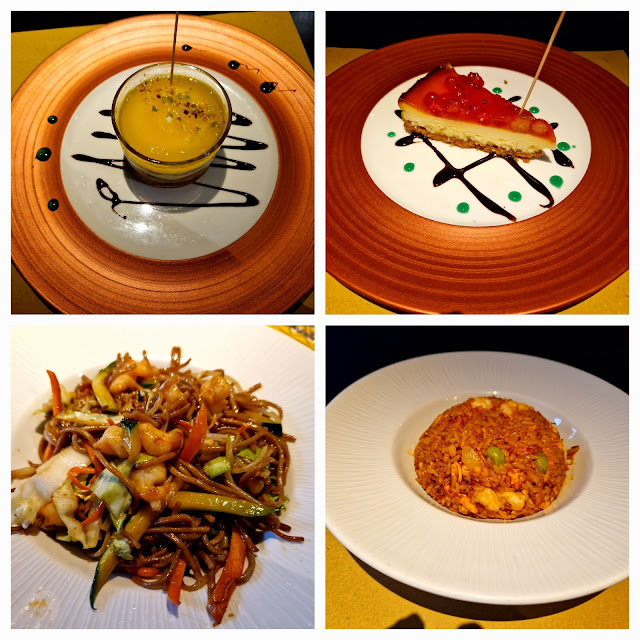



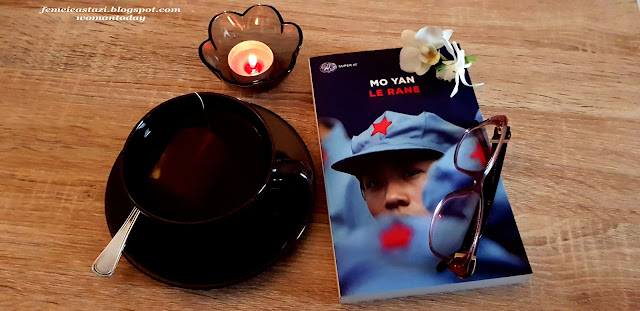

























.jpg)
.jpg)